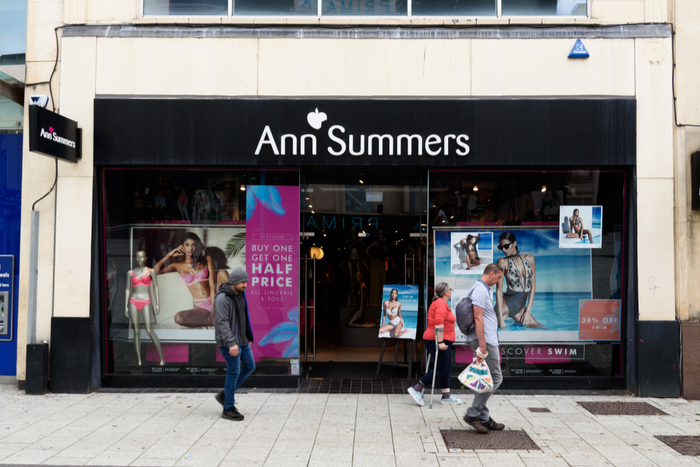Ann Summers, named after founder ichael Caborn-Waterfield’s female secretary Annice Summers, has had a presence on the UK high streets for the past five decades as a lingerie and sex toy retailer.
From launching an interactive app to introducing a Party Plan business, Ann Summers’ long-time success appears to be hanging by a thread after chief executive Jacqueline Gold said this week that the retailer might opt for a CVA.
As landlords refuse to work in partnership with the business and the owning family’s cash injection seemingly not being enough, Ann Summers could well launch a CVA as soon as this week after facing increased losses in its recent financial report.

The lingerie sector is already reeling from the collapse of US giant Victoria’s Secret UK operations, which went into administration on June 5 and placed over 800 jobs at risk.
However, Ann Summers appears to be trying to avoid a similar fate to its embattled US rival. Just this week, the retailer warned its stores’ landlords that they must take “a more pragmatic approach” to negotiations over rents.
Ann Summers said that if this did not happen, it would ask to restructure its rent costs through a CVA. It also said sales could have a slow recovery due to the Covid-19 pandemic, making it hard for the retailer to pay rents and business rates – although the latter won’t have to be paid until the next financial year due to the one-year holiday currently in place.
Gold accused landlords of continuing to “bury their heads in the sand”. With a store-estate of 90 across the UK, Ann Summers saw its losses deepen from £3 million to £16 million in the year to June 2019.

The retailer hasn’t always struggled. Despite difficult trading prior to the coronavirus crisis, Ann Summers said in 2018 that its Party Plan business – which enjoyed popularity following ITV’s Brief Encounters programme documenting private selling parties – had boosted sales to £109 million.
Peter Scott, head of retail consultancy at Graystone Strategy, argued that Ann Summers has long term and diverse sales channels including bricks-and-mortar, digital, Party Plan and call centres all working in harmony to target different customer audiences.
“Ann Summers isn’t as solely dependent on retail for success as Victoria’s Secret is,” he explained.
“Some of these sales channels have operated longer than its retail channel, such as Party Plan, and its website which has been trading for nearly 20 years.
“Even though Ann Summers may score rent reductions now, store closures will still be highly likely”
“Its product range is more diverse and targets across the age spectrum, more so than Victoria’s Secret, which is quite youth focused.
“Ann Summers appeals to a broad age range and the product mix stretches from lingerie to hen nights.
“Its retail estate is older than Victoria Secrets’ and therefore it probably isn’t just about stores being in high profile and expensive locations.
“Some of its stores will be in town centres where new developments have happened in the last 20 years leaving it off pitch.
“Ann Summers’ stores aren’t oversized in the way Victoria’s Secrets’ are, and have often occupied efficient space, such as narrow and long stores – which tend to suit the dynamic nature of the product without the need for loads of windows.”
Ann Summers first hired property advisers from CWM in April 2019 to consider options and assist it in negotiating with landlords for lower rents across its 106 stores at the time. It came after the lingerie retailer swung to a full-year operating loss of £3.16 million for the year ending June 30, 2018. A spokesperson for Ann Summers told Retail Gazette at the time that the move was a “cost effective and responsible way of working”.
Despite winning better property terms from landlords for most of its store estate in August, Gold warned that a CVA may be considered if property owners refuse to be more flexible.
For at least four decades, Victoria’s Secret appeared to be the epitome of lingerie success around the world. From investing in organic and fair trade-grown cotton to its celebrity-studded runway shows, the company was attempting to transform its brand. But in 2016 – 39 years after it was founded – it hit a brick a wall when its annual fashion show was accused of cultural appropriation of both Chinese and Mexican cultures.
While Ann Summers may be facing a different kind of threat to its business and may not have high-profile runway shows, but it offers an extensive and diverse collection on its platform, such as an adult toy store, as well as a plus size collection. In comparison, Victoria’s Secret was late to launching a plus size range – in 2019.
In addition, Victoria’s Secret became notorious for its use of super slim models and its refusal to include plus-size women for many years – a mistake that Ann Summers has seemingly managed to avoid.

Rick Smith, managing director at business management consultancy Forbes Burton, argued that Ann Summers appears to have taken “a more pro-active approach”. He said the retailer has recognised that rents are hurting the business, and “by threatening to use an insolvency procedure, it may be able to get some reduction”.
“This is only the start,” he said.
“Sales are shifting online for its products and even though Ann Summers may well score some rent reductions now, in the long term store closures will still be highly likely.
“It’s undeniable that we have seen a plunge in footfall across city centres”
“Things are looking slightly better for Ann Summers after making a £16 million loss last year with the pick up in online sales, but it will need to examine its marketing plan and strategy carefully to see whether bricks and mortar stores are viable or should be cut loose.”
Sheena Ray, commercial property partner at Keystone Law, said Ann Summers’ quest of calling for turnover rents is an initiative that “will be welcomed by many in the industry” in an effort to survive Covid-19.
“However, landlords and investors remain reluctant to implement these as standard,” she explained.
“It’s undeniable that we have seen a plunge in footfall across city centres, but we have yet to see the accelerated move to turnover based rents as we did in the 2008 recession.
“Turnover rents focus on sharing risk and reward between landlord and tenant and are the norm across mainland Europe.
“Given the anticipated changes in consumer habits, it’s potentially the only way forward if bricks and mortar stores are to survive.
“A small number of landlords are now offering it as standard across their portfolios – and while the lack of certainty on rental income is not ideal for investors, it’s preferable to empty high streets and shopping centres.”
The tell-tale signs that the retail sector is shifting towards online is everywhere, and Ann Summers may need to readjust its whole business plan in order to survive. After all, more and more retailers are realising that, especially in a post-Covid world, store estates are a huge corporate expense and regularly need a restructure.
While Ann Summers’ marketing strategies and diverse offering may have helped with its success in the past, the retailer still needs to keep things fresh and alive – something which Victoria’s Secret has failed to consider.
Click here to sign up to Retail Gazette’s free daily email newsletter


















